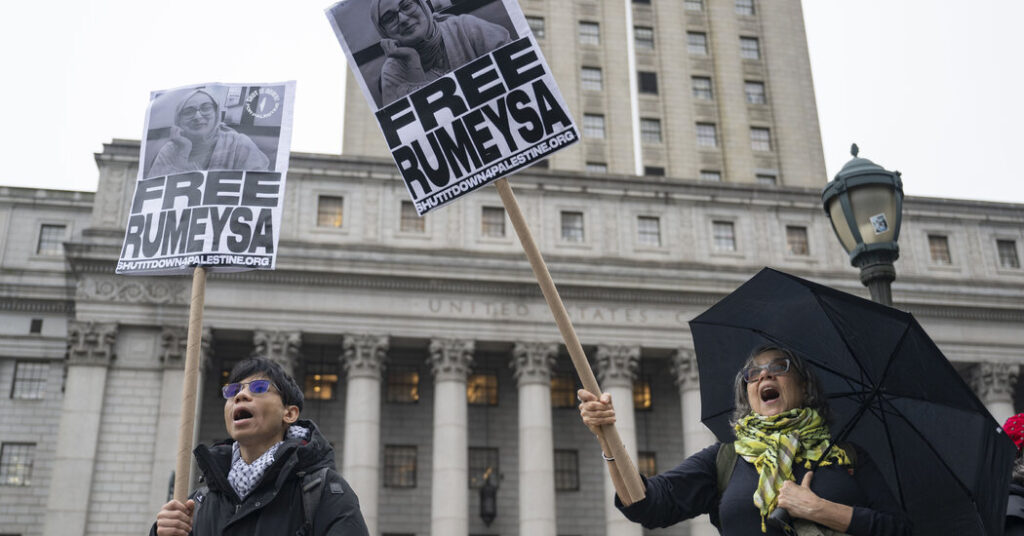Rumeysa Ozturk’s plane touched down in Boston on Saturday evening, ending a six-week odyssey for the student in federal custody that stirred outrage over President Trump’s immigration crackdown.
Her return to Massachusetts, where she was arrested in March, came one day after a federal judge in Vermont ordered that she be immediately released from a detention facility in Louisiana.
After arriving at Boston Logan International Airport, Ms. Ozturk walked into a room with a big smile on her face, and was joined by her lawyers and Massachusetts lawmakers, including Senator Edward J. Markey and Representative Ayanna Pressley.
Ms. Ozturk became visibly emotional as lawmakers spoke about her ordeal. Her case “affects every one of us,” Mr. Markey said. “Freedom of speech and the right of due process are not suggestions.”
Ms. Ozturk, a Turkish citizen studying at Tufts University on a student visa, was among more than a thousand international students whose visas were canceled by the federal government and who have faced deportation. The moves came as the Trump administration escalated its attack on higher education, saying its goal was to root out antisemitism.
Ms. Ozturk had written an opinion piece in the student newspaper criticizing the university’s response to pro-Palestinian demands. Her supporters denied that she was antisemitic, and said that she was detained in retaliation for her speech in violation of the First Amendment.
On Saturday, her friends and former professors bounced between joy at her release and hurt that Ms. Ozturk, a Fulbright scholar who specializes in children’s media and who is known as a studious rule follower, would have ever been detained.
“She is one of the most humanistic, compassionate, and kindhearted people I have ever known,” Mehmet Fatih Uslu, one of her former professors, said in an email. Her undergraduate thesis, which focused on death in children’s literature, reflected her sensitive nature, he said. Ms. Ozturk, a fifth-year doctoral student, is scheduled to finish her doctoral dissertation in February, according to court testimony.
On Friday, Judge William K. Sessions III of the U.S. District Court for the District of Vermont said her detention would potentially chill “the speech of the millions and millions of individuals in this country who are not citizens.” He also said the government, which has accused Ms. Ozturk of engaging “in activities in support of Hamas,” had not introduced any evidence other than the pro-Palestinian opinion essay that Ms. Ozturk co-authored.
A message left for the Department of Homeland Security was not immediately returned. In response to an earlier development in Ms. Ozturk’s case this week, a spokeswoman said that “a visa is a privilege, not a right” and that the department would “continue to fight for the arrest, detention and removal of aliens who have no right to be in this country.”
The arrest of Ms. Ozturk was captured on surveillance footage and drew condemnation from students, college leaders and immigration advocates nationwide. She was walking down a sidewalk in Somerville, Mass., when she was surrounded by armed immigration agents and whisked into a van. She was driven to New Hampshire, and then to Vermont, and then flown to a federal detention facility in Louisiana.
While being detained, Ms. Ozturk testified that she experienced increasingly severe asthma attacks, the first being on the plane to Louisiana. When she sought treatment, she said, the detention center’s medical staff responded condescendingly. She said she had been confined with 23 other women in a space meant for 14 people.
Reyyan Bilge, a psychology professor at Northeastern, knew Ms. Ozturk when she was an undergraduate in Turkey, and described an emotional roller coaster over the last six weeks, starting with her disbelief that her former student had been arrested. She said Ms. Ozturk was “one of the best students I’ve ever had.” Dr. Bilge followed every development in the case, logging into each court hearing, and received another shock, this time joyful, at Friday’s hearing.
“You hear the words that you’ve been waiting to hear for a really long time,” she said in a phone interview. “But at the same time, you really want to pinch yourself. Is it real? Are they going to allow her to leave?”
Ms. Ozturk’s release was in fact delayed when the government sought to make her wear an ankle monitor, prompting Judge Sessions to issue a second order on Friday for her to be released without it.
Even though Ms. Ozturk was freed, a government lawyer on Friday said a deportation proceeding against her would continue in immigration court. But the long-term outlook is believed to be more favorable for her now than it was before the federal court released her, experts said.

